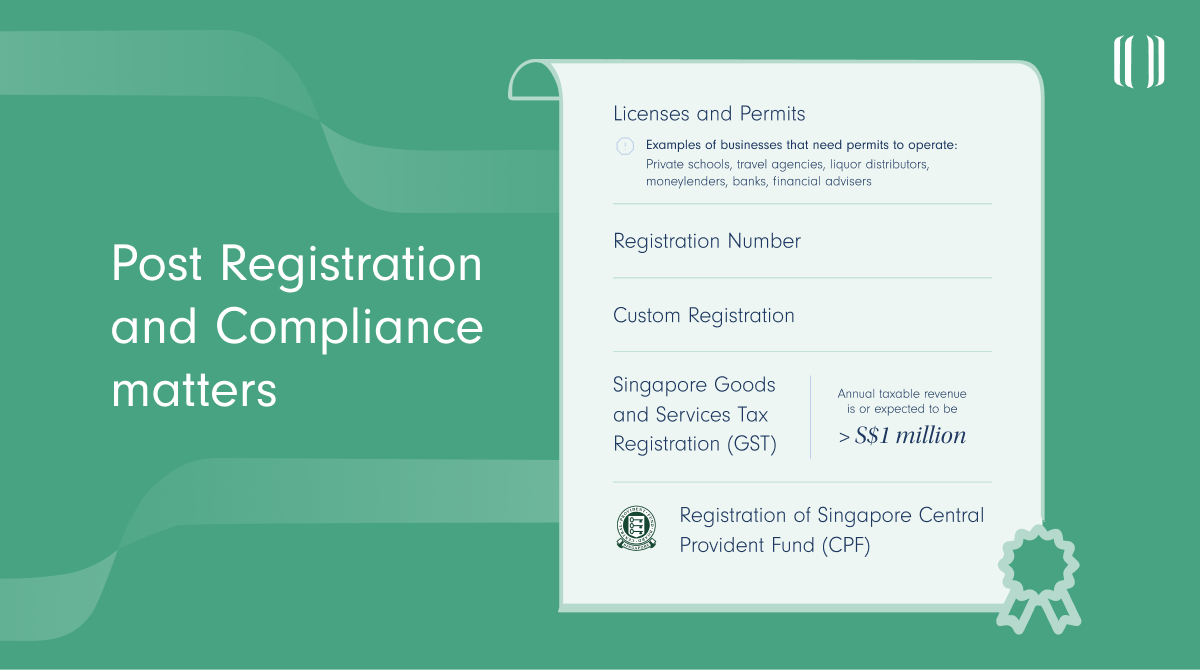Singapore company registration is known for its efficiency and simplicity. To ensure a smooth incorporation process, it’s essential to understand the requirements and related information. If you’re considering relocating to Singapore for your business, our guide on Singapore Immigration and Work Visas can be helpful for you.
If you prefer to operate your business from abroad, that’s also possible with the assistance of the right service providers. From the initial steps of the Singapore company registration process to ongoing support, they can help you achieve your goals. Additionally, check out our previous guide to discover the benefits of Singapore company registration.
The Singapore Company Registration Process
The most common type of business entity to set up in Singapore is a private limited company due to being recognised as a separate legal entity and available tax incentives for this business structure.
A private limited company is limited by shares and has a separate legal entity from its shareholders. It is recognised as a taxable entity in its own right. As a result, shareholders of a Singapore private limited company are not liable for its debts and losses beyond their amount of share capital.
All companies in Singapore must be registered with the Accounting & Corporate Regulatory Authority (ACRA) and abide by the Companies Act. The following steps will help you gain an easy understanding of incorporating a company in Singapore:
Singapore Company Registration Process
- Minimum Company Registration Requirements Preparation
- The Incorporation Process
- Post Registration and Compliance Matters
- Opening an SG Bank Account
Related Reference: FAQs about registering your company in Singapore
Singapore Company Registration Requirements
Minimum Singapore company registration to provide to your service provider:
- 1 Shareholder (either individual or corporate entity)
- Initial paid-up share capital of at least S$1
- 1 Resident Director
- 1 Company Secretary
- A physical Singapore registered office address

1. Company Name
The company name must be approved by ACRA before the business can be incorporated. ACRA will reject a proposed company name for incorporation if it is:
- Identical to another existing Company Name
- Undesirable names
- Similar to established brands or trademarks
2. Shareholders
They are a person or a corporate entity who subscribed for shares in the company or by purchasing the company’s shares. Singapore Companies Act allows a minimum of one and a maximum of 50 shareholders for a Singapore Private Limited Company where either a corporate or individual shareholder is appointed. A director and shareholder can be the same or different person. 100% local or foreign shareholding is allowed.
3. Local Resident Director
Singapore Private Limited Company must have at least one director who must be an “ordinarily” resident in Singapore (Singapore citizen; Singapore permanent resident). The director must be at least 18 years of age, and must not be bankrupt or convicted for any criminal malpractice in the past. Directors can also be shareholders or vice versa. There is no limit on the number of additional local or foreign directors that can be appointed.
4. Company Secretary
All Singapore Companies must also appoint a competent Company Secretary within six months of incorporation, whose main responsibility is to ensure regulatory compliance. The company secretary must be a natural person who is “ordinarily” resident in Singapore. Even if one were to avail of corporate secretary services, it is possible to transfer service providers.
5. Paid-up Capital
The minimum paid-up capital for Singapore company registration is S$1 or its equivalent in any currency. The minimum issued capital is one share of par value. “Bearer” shares or “No par value” shares are not permitted. The paid-up capital can be increased anytime even after the incorporation of the company.
6. Registered Address
The registered address must be a physical address and cannot be a PO Box. The use of residential addresses is allowed for certain types of business. Companies must also have a registered office to which all notices and official documents may be sent and at which the company is to keep the various registers that it is required to maintain under the law.
Thinking of Incorporating it in Singapore? Reach out to our team to find out more about our incorporation package.
Timeline for the Singapore Company Registration
The company name reservation typically takes up to a day. There are 3 possible outcomes, namely approved, rejected, or referred.
- Approved – Ready to process for incorporation step.
- Rejected – If it is too similar to an existing name.
- Referred – If the name is considered to be sensitive, or if it includes specific references to regulated industries, e.g., media, nutrition, or school, the application will be referred to the relevant authority for approval which can take from 7 days up to 2 months for approval.
Once approved, the name will be reserved for 60 days and incorporation should be completed within this period. If not, an extension will need to be applied or a resubmission will be required.
It is important that all information and identification documents were submitted to prevent any delay in compliance approval. Additional documents may be requested by the compliance team for further verification or certain documents will be required to be notarized.
The whole process can take up to 14 days but is highly dependent on having all the documents ready for the initiation and to help streamline the process for a shorter timeframe.
The Incorporation Process
Here are the steps to register a company in Singapore:
| Steps | Procedure | Responsibility | Notes |
| 1 | Complete pre-incorporation form to expedite the business registration process | Client | Singapore Pre-Incorporation Form. |
| Upon receiving the information and KYC documentation: | |||
| 2 | Review your documentation to ensure that all required documents have been provided. Our compliance team will then conduct a due diligence review before approving the on-boarding of you as a client. | Lanturn | |
| 3 | Issue Invoice/ Payment of Invoice | Lanturn/ Client | Upon receipt of payment, we will begin the incorporation preparation process |
| 4 | Reserve the company name and upon approval prepare all required documents. | Lanturn | |
| 5 | The signing of incorporation documents | Client | Sent out via emal for e-signature |
| Upon completion of the above: | |||
| 6 | Incorporate the company with the Accounting & Corporate Regulatory Authority of Singapore (ACRA) | Lanturn | |
| 7 | Issuance of corporate documents:Share certificates for each of the shareholdersStatutory Registers | Lanturn | |
| 8 | Prepare company resolution and supporting documents for bank account opening | Lanturn/ Client |
Post Singapore Company Registration Matters
Following are the post-incorporation and compliance details to be noted:
- Licenses and Permits
Some business activities in Singapore are subject to regulation by government authorities. Even if your business firm has been registered you cannot begin operation or provide service unless your company receives the necessary approval or license from the relevant government authorities before company Incorporation.
Private schools, travel agencies, liquor distributors, moneylenders, banks, and financial advisers, are some examples of businesses that need permits to operate. - Registration Number
The business registration number issued by ACRA must be on all letterheads, invoices, billings, or other documents used for official business communications. - Custom Registration
If your business activities involve import, export, and transhipment in and out of Singapore, you will need to register your company with Singapore Customs and obtain a CR Number commonly known as Custom Registration. The central registration number is mandatory for Singapore companies or organizations engaged in trading activities. - Singapore Goods and Services Tax Registration
Goods and Services Tax (GST) is a tax on the supply of goods and services in Singapore and on the import of goods into Singapore. Goods exported from Singapore and international services provided from Singapore are exempt from GST. The current rate is 8%.
All Singapore businesses must register for GST if their annual taxable revenue is more than S$1 million, or currently making taxable supplies and the annual taxable revenue is expected to be more than S$1 million. The business is expected to register for GST within thirty days from the time it is deemed liable. For detailed information check the GST guide in our blog. - Registration of Singapore Central Provident Fund (CPF)
The Central Provident Fund or CPF is a compulsory pension fund scheme in which the employer and employee contribute a percentage of the monthly salary to the fund. CPF contribution by the employer is mandatory for all local employees who are Singapore citizens or permanent residents earning more than S$500 a month. The maximum CPF contribution rate for employer and employee is 17% and 20% respectively and can be lower depending on certain factors such as employee age, permanent resident status, etc. CPF contribution for foreign employees is not required.
Opening a Corporate Bank Account in Singapore
Once the company has been incorporated, you may open a corporate bank account in Singapore with any of the local or international banks based in Singapore.
Most banks require that the account signatories and directors be physically present in Singapore for paperwork signing when opening the company bank account. If you are unable to come to Singapore, some banks may accept the signing of documents at one of their overseas branches or at a Notary Public.
We are working closely with both traditional banks and digital-only banks to assist clients with remote account opening. You may find more information about OCBC and AirWallex here.
Related Reference: Lanturn’s guide to Singapore neobanks
Lanturn Singapore Company Registration Services
Seeking support from a proficient professional like Lanturn can fast-track the incorporation process and guarantee the meticulous organization of all your paperwork.
At Lanturn, we pride ourselves on offering comprehensive solutions to foster your business’s growth. Our services encompass corporate secretary support, accounting and payroll management, tax expertise, and visa assistance. Whether you’re considering a private limited company or exploring other options like sole proprietorships, branch offices, or non-profit organizations, we’re here to guide you every step of the way.
Send us a message, and let’s kickstart the journey to bring your business idea to life.

